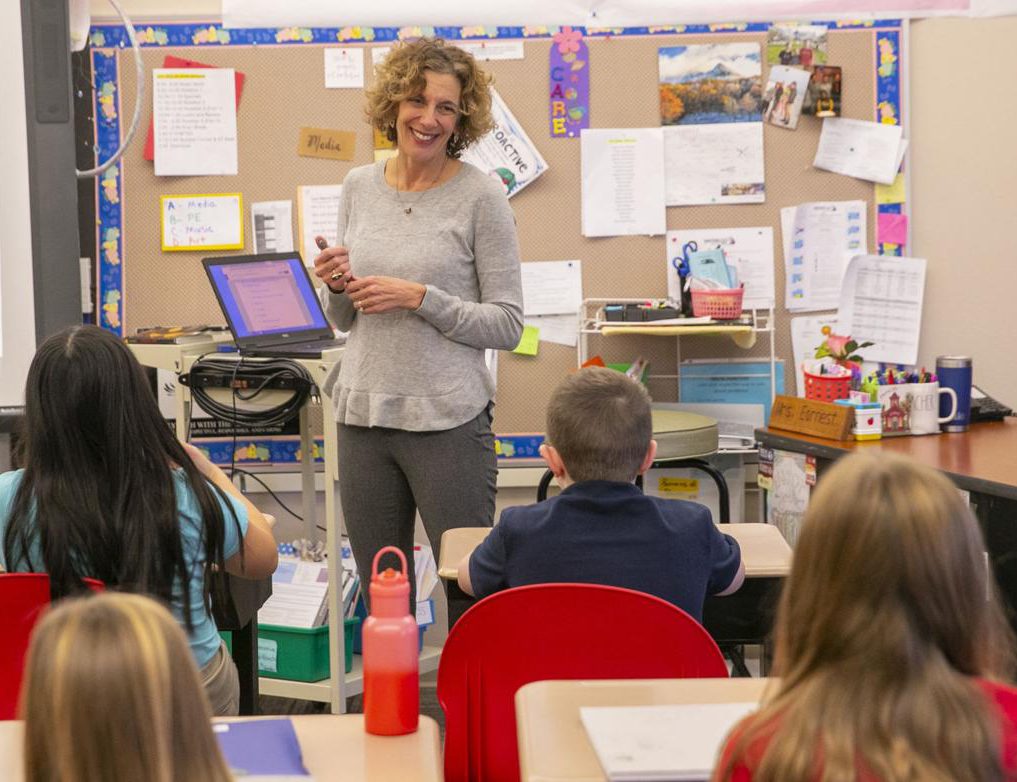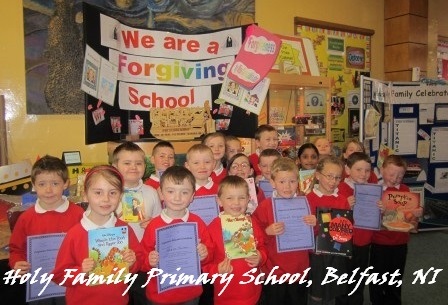Tagged: “family”
Finding Hope in the Midst of Trauma
Editor’s Note: This blog post was written by Dr. Suzanne Freedman, Educational Psychology Professor at the University of Northern Iowa, and is reposted with the permission of both the author and of Darlene J. Harris, creator of the website “And He Restoreth My Soul Project” where the blog originally appeared on May 1, 2022.
I automatically connect hope to my work on the topic of interpersonal forgiveness as an approach to healing from a deep, personal and unfair hurt. In this blog post, I will discuss why I believe choosing to forgive can offer individuals who have experienced the trauma of child abuse or sexual assault hope of healing and the power to move beyond their abuse.

“Forgiveness offers a way to heal, and have hope for the future, while acknowledging what happened was wrong, unfair, and extremely hurtful,” according to Dr. Suzanne Freedman, shown here during a research project with 5th grade students.
It is normal and natural to feel angry, and hopeless as a result of childhood or sexual assault trauma and one has a right to these feelings for experiencing something no individual should have to go through. If one believes that healing is impossible and/or there is nothing that can change their current attitude, feelings, and thoughts toward their abuser, it is likely they will feel despair and quite hopeless. Forgiveness offers an option for healing that allows one to hope and have faith in a better future, while also acknowledging that the abuse they experienced was unfair, deeply hurtful and unacceptable.
“I am often asked ‘Why forgive?’ and my response is always the same, ‘What’s the alternative?’
Although forgiveness cannot undo the injury or damage caused by the injury, it allows us to move forward in our lives without the negative effects of all-consuming anger, hatred, and resentment.
It offers a way to heal and have hope for the future.”
Dr. Suzanne Freedman
Hope is believing that things will get better even if they don’t feel that way now. Hope is making the decision to forgive and committing to the process, even if one does not feel the forgiveness in their heart yet. Knowing that one is strong enough to move forward in their own healing, at their own pace increases feelings of hope for the future and leads to greater emotional and physical well-being.
Hope isn’t just nice to have, at times it is essential for survival in unbearable situations. Without hope, the will to live can diminish. One may stop caring about themselves and others, and their beliefs toward achieving a good life decrease. Hope, although scary, is directly related to a person’s belief that they can cope and move beyond the abuse or trauma they have endured.
Read the rest of Dr. Freedman’s full blog at “Finding Hope in the Midst of Trauma.”
Dr. Suzanne Freedman is a Professor in the Educational Psychology Department at the University of Northern Iowa in Cedar Falls, Iowa. Her dissertation on forgiveness with incest survivors at the University of Wisconsin-Madison was a landmark study that was published in the Journal of Consulting and Clinical Psychology. She will be a speaker at the July 19-20, 2022, International Educational Conference on Agape Love and Forgiveness in Madison, WI.
Darlene J. Harris is a sought-after speaker, author of And He Restoreth My Soul (an anthology and resource guide on sexual violence), and the developer/leader of workshops and retreats for women. She writes primarily on the topics of sexual abuse and molestation because by the age of 18 she had been raped twice. “I don’t want anyone to hurt like I did,” is the mantra that drives her. Read her true-life story in her own words.
Checking in Again on Your Unfolding Love Story
For over 10 years on this site, we have posted a reflection in which we encourage readers to grow in love as their legacy of the present year. We have said this across the years:
“Give love away as your legacy of 2022.
How can you start? I recommend starting by looking backward at one incident of 2021. Please think of one incident with one person in which you were loved unconditionally, perhaps even surprised by a partner or a parent or a caring colleague. Think of your reaction when you felt love coming from the other and you felt love in your heart and the other saw it in your eyes. What was said? How were you affirmed for who you are, not necessarily for something you did? What was the other’s heart like, and yours?”
It is now about four months later. Can you list some specific, concrete ways in which you have chosen love over indifference? Love over annoyance? If so, what are those specifics and how are they loving? We ask because we have only about eight months left to 2022. Have you engaged in about a third of all the loving responses that you will leave in this world this year?
If you have not yet deliberately left love (or enough love) in the world this year, there is time. . . . . and the clock is ticking.
Robert
Benefits of Classroom Forgiveness Education Confirmed by New Groundbreaking Study
.
Published this month in Child Development1 (Volume 93, Issue 2, March/April 2022), the critique analyzed 20 randomized intervention studies of forgiveness education programs that were  implemented during school years 1996 through 2021. These studies spanned demographically diverse geographic areas including North America, Europe, Asia, and the Middle East.
implemented during school years 1996 through 2021. These studies spanned demographically diverse geographic areas including North America, Europe, Asia, and the Middle East.
The research, “A meta‐analysis of forgiveness education interventions’ effects on forgiveness and anger in children and adolescents,” was conducted by University of Wisconsin-Madison researchers Hannah Rapp and Jiahe Wang Xu (both graduate students in the Dept. of Educational Psychology), and Dr. Robert Enright, educational psychology professor and co-founder of the International Forgiveness Institute (IFI).
Other significant observations and findings in the just-published report include:
- Children and adolescents inexplicably experience hurt and conflict in their interpersonal relationships and can “benefit from learning more about what forgiveness is and the process of how to forgive.”
- Forgiveness education interventions “are effective regardless of whether participants have experienced severe or mild offenses or attend schools in economically disadvantaged areas.”
- Programs of both short and long durations “can lead to significant positive change in anger and forgiveness outcomes.”
- Children who forgive are more accepted by their peers.
- Positive results for students “echoed findings from previous reviews of forgiveness interventions with primarily adult populations.”
- Forgiveness education interventions are “significantly effective” whether they are facilitated by schoolteachers or by researchers.
- The forgiveness education curriculum and process developed by Dr. Enright2 and the IFI “yielded significant effects.”
Overall, the analysis presents strong evidence that “children and adolescents can benefit from forgiveness education interventions.” Read the full meta-analysis report.
_______________________________________________________________________________________________________
1 Child Development is a 92-year-old bimonthly scientific journal published by the Society for Research in Child Development (SRCD). It is a vital source of information not only for researchers and theoreticians, but for a broad range of psychiatrists and psychologists, educators, and social workers in more than 60 countries around the world.
2 The Forgiveness Education curricula developed by Dr. Enright and the IFI for pre-k through 12th grade students is based on children’s story books. Those stories teach about forgiveness and other moral virtues and equip children with the knowledge of how to forgive a specific person who offends if they choose to do so. Lessons begin by educating participants about the five concepts that underlay forgiveness: inherent worth, kindness, respect, generosity, and agape love. During the program, participants read and discuss several age and culture-appropriate stories that display forgiveness between characters such as in The Tale of Despereaux by Kate DiCamillo and in Horton Hears a Who! by Dr. Seuss.
My partner and I have different political views. I try to be respectful of his views, but he definitely is not respectful of my views or of me in particular. Help! How can I forgive him and start a productive dialogue about this?
I think you need to talk with your partner about what it means to be a person. Are people more than their political positions? If so, what is this “more” that goes beyond the political? Does he see these other important qualities in you? I think he needs to broaden his perspective that human beings, in their importance, transcend politics. This is not easy to learn and so he and you will have to work on this more transcendent perspective. As you forgive, try to see these larger human qualities in your partner. Such a wider perspective likely will help you in the forgiveness process.
I am doing research on forgiveness as an idea in the heart of humanity. In your own studies, what do you see as the earliest, ancient work that describes person-to-person forgiveness?
The oldest account of person-to-person forgiving that I have found is in the Hebrew Scriptures, in Genesis 37-45 in which Joseph forgives his 10 half-brothers for attempted murder and then selling him into slavery in Egypt. Joseph ends up unconditionally forgiving them and providing provisions for the Hebrew nation that was suffering from famine.



